Article 57: Coffee and the decade of innovation “reshaping America”
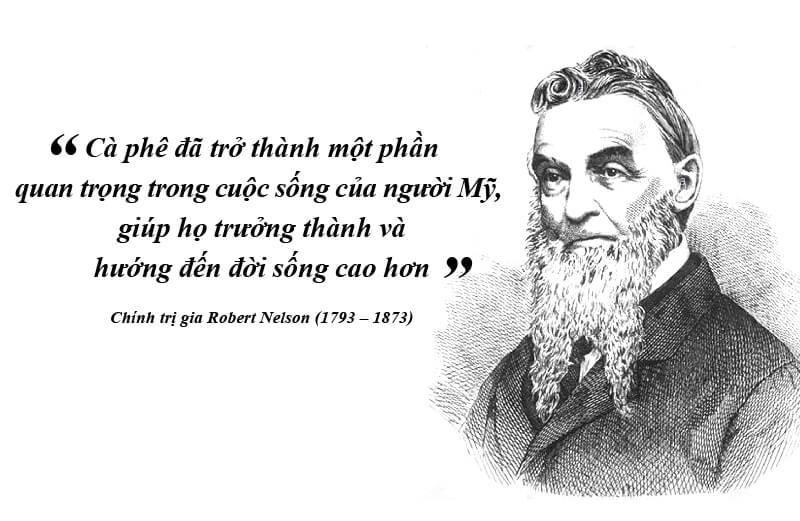
“Coffee has become an important part of American life, helping them to mature and lead a higher life” Politician Robert Nelson (1793-1873)
“Roaring Twenties” is a term that characterizes the distinct culture of the 1920s and 1930s, a decade of discovery and innovation that established the status of a prosperous American power through the establishment of new living values.
New value shaping space
When the World War I ended, the American worldview changed completely. American soldiers returned from Europe with painful memories of loss and big questions about the true value of life. Women participated in social activities with the role of replacing men who have gone to war, breaking gender norms. People of color serving in segregated units, enduring racial inequities formed the will to change stereotypes about African Americans in order to gain full citizenship in a truly democratic society. In this sense, the desire to change fate created a society that fought to establish new life value systems.
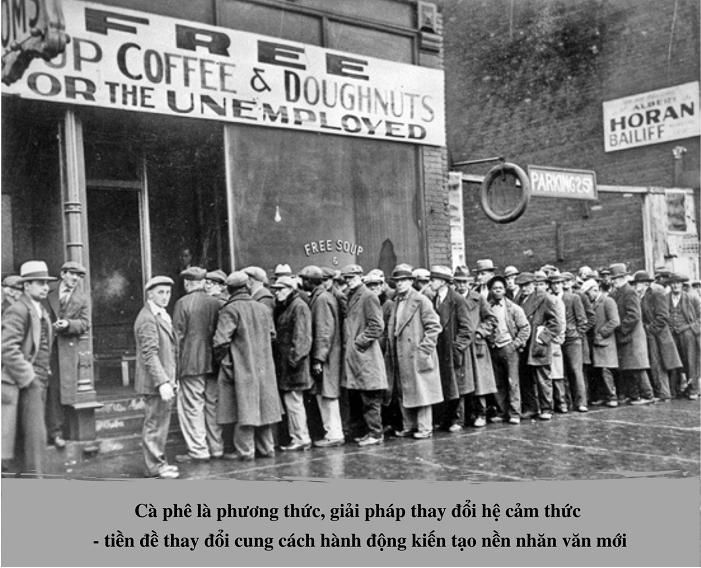
Coffee was the method, the solution to change the social perception – the premise to change the way of action to create a new humanity.
This period, the US Congress enacted the Volstead Act closing all pubs and bars and banning the sale of “intoxicating drinks”. It is considered one of the strictest laws in the world, attempting to promote social change and moral uplift through national legislation. Coffee consumption and the number of coffee shops increased many times. Proponents of alcohol bans hoped that coffee would become a drink that helped people make better lifestyle choices.
The term “Café Society” officially appeared in media publications with the description as a pioneer place for trendy lifestyle, space of beautiful, dynamic, and creative people. The most influential intellectuals at that time such as Walter White, Ralph Bunche, Richard Wright, Franklin Frazier, Sterling Brown… people with the will to change destiny like Henry Ford, Charlie Chaplin, Mark Twain, Yves Saint Laurent, Cole Porter, Norman Rockwell… the greatest talents in Jazz history including Louis Armstrong, Josh White, Ida James, Duke Ellington… met in “Café Society” to start the American Modernism movements, the Harlem Renaissance and the trends in music, fashion, and cinema… creating important changes in the daily social life of Americans.
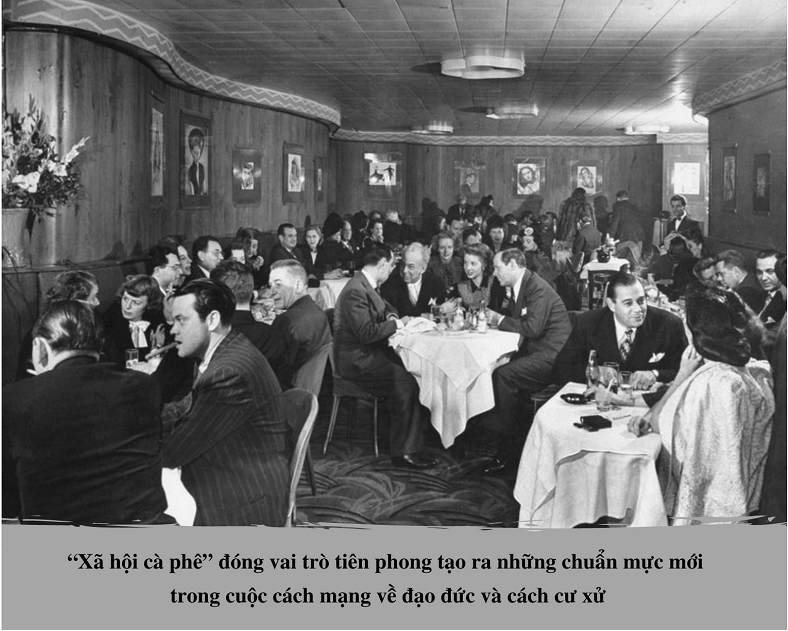
The “Café society” plays a pioneering role in creating new standards in the revolution in ethics and behavior.
Coffee houses that influenced the cultural life of the community such as Proletcos Cooperative Cafeteria, Delmonico’s, The Vendome (New York), Blanco’s Café (San Francisco), Cooper’s Cafeteria (Illinois), Richards Treat Cafeteria (Minneapolis), Miss Hulling’s (St. Louis)… were described as a place of happiness, a temple of art and beauty.
Coming from the criteria in contemplation style, the costumes for waiters and customers as a special kind of ritual, which made the cafe a stage for exemplary lifestyle. Men came to cafes in suits, cloaks, fedoras or homburg hats… Women wore glamorous gowns, beaded evening gowns inspired by “flappers”, elegant hats and fine jewelries. How to enjoy food and drink was also considered a code of conduct. There were even a lot of books and newspapers detailing the correct manners when going to the cafeteria.
From the typical behavior style and the majority of people who came to the café belonged to the middle – upper class, the intellectual elite, so the customers of the cafe were collectively referred to as Respectable People. Therefore, the cafe space played a pioneering role in creating new standards and leading contemporary lifestyles.
The space that defined self – position – ideology
It’s no coincidence that “Café Society” was popular in America right in the “Roaring Twenties” era. Going beyond ordinary consumption, coffee and coffee shops provided opportunities and solutions for people to define their self – position – ideology.
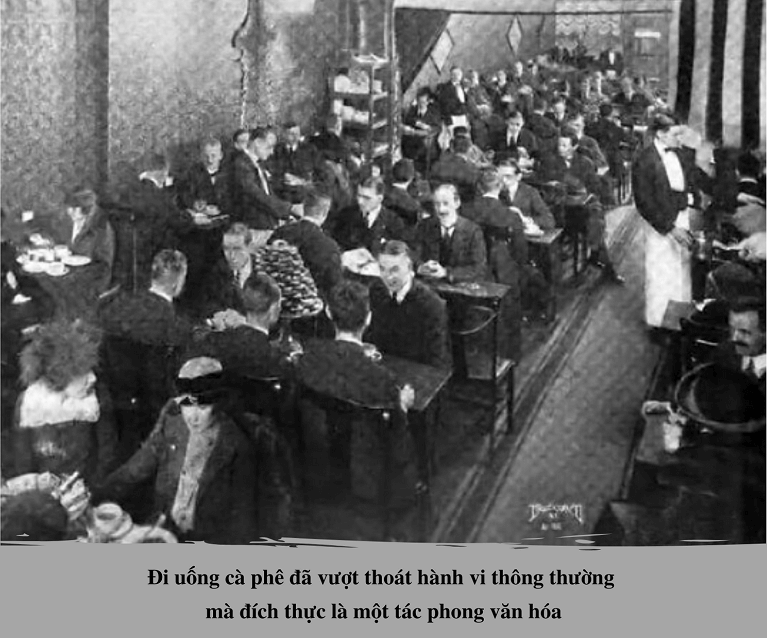
Going to café went beyond a common behavior and became truly a cultural style
The desire to re-define oneself, where each behavior such as where to show up, what to buy, what to wear, what to eat is a kind of “language” that reveals personal qualities (defining self). If intoxicating drinks are being eliminated, coffee is honored as a drink that represents the image of a virtuous person. Presenting in an exemplary space, enjoying coffee – the source of creative energy is self-affirmation, the way in which a person feels proud, confident with himself intellectually, emotionally and physically.
When you are self-aware of your own values and beliefs, you tend to mark your position (defining position). Coffee shops carry an image of displaying civilized progress, a smart space to expand knowledge, a special place to promote unique creations, while ensuring the position-defining functions that people are searching for.
The Double-R Coffee House chain of cafes was built by the family of US President Teddy Roosevelt with a style similar to London’s ancient academies. The goal of the Roosevelt family was to create a classy and professional cafe that provided a great place for “Free spirits to display their deepest dreams”. At that time, Double-R Coffee House was a gathering place for aspiring playwrights, actors, artists and musicians, especially the Kalem Club – the most influential American literary group of the 20th century. The Algonquin café was where the Algonquin Round Table group worked together and collectively called it a creative circle. Most of the members of the Algonquin Round Table such as Art Samuels, Harpo Marx, Charles MacArthur, Dorothy Parker, Alexander Woollcott… achieved a reputation for their contributions to literature and art.
Alice Foot MacDougall – a poor widow opened a small coffee shop in Grand Central Station. On the cafe’s menu was the statement “Each drink choice explains your character and predicts your future”. In 1926, she published Coffee and Waffles, a guide to coffee recipes. This created a special attraction and in just 8 years (1919-1927), the small coffee shop had grown into the largest coffee shop chain in the heart of New York. Alice Foot MacDougall also became a symbol of the American women’s dream in the post-war era.
As Chicago became the creative capital of jazz innovation, the Sunset Café played an important role in blending Americans of color with other ethnicities. Many musicians who were part of the Harlem Renaissance developed their careers at Sunset Café. The cafes in the Harlem neighborhood, Manhattan (New York) were the center of activities that changed the social, political, and artistic status for African Americans and built the image of New Negro.
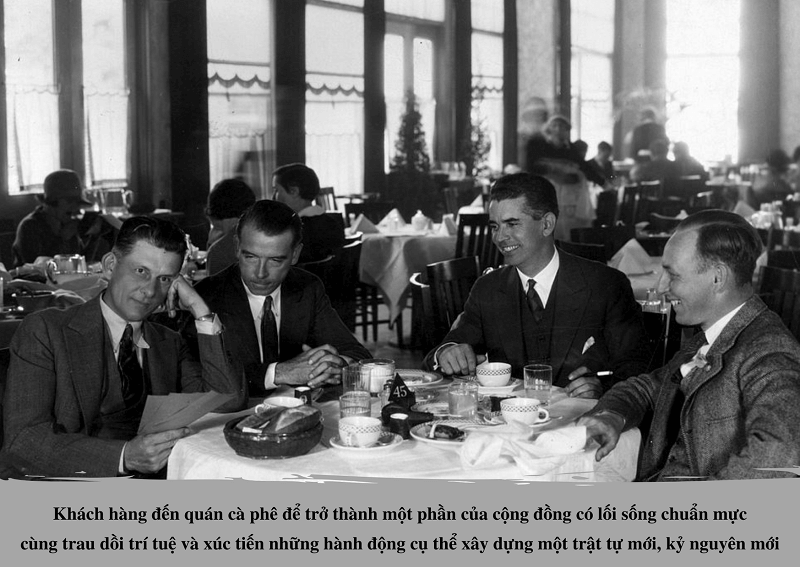
Customers went to cafe to become part of a community that shared a decent standard of living, together they cultivated wisdom and promoted concrete actions to build a new order, a new era.
It is no coincidence that the 1920-1930s were identified as the innovation era, the Roaring Twenties, the Jazz age… In the midst of a society that was trying to create new life values with the creativity of the mind, mindfulness in lifestyle, people had the need to choose the method of affirming the desire to integrate into the community that they chose as the norm (defining ideology). In this process, real coffee shops were spaces and environments that connected collective relationships that shared the same lifestyle choices, shared a common ideology of values and standards of behavior. It can be understood that customers went to café to become part of a community that shared a mindful, creative lifestyle, together they cultivated wisdom and promoted concrete actions to build a new order, a new era.
The incredible creativity of the café communities was a great turning point in the formation of the American superpower. The years 1920-1930 saw the birth of the automobile, radio, television, and aviation industries; the development of cities; the rise of consumer culture; the explosion of mass entertainment, liberating thought from traditional ways, helped the United States create the most prosperous cultural economy in history.
From efforts to clearly realize the value of one’s own qualities (defining self) to establishing an individual’s position with society (defining position) and affirming himself as a member of a special community, knowing how to live, daring to create, dare to influence (defining ideology), the café has always been the space that provides solutions to affirm human identity to create a new humanity.
View more: https://bit.ly/caphetrietdao
THE REAL COFFEE
ROASTED ONLY FOR PEOPLE OF WISDOM!
Source: “The Philosophical Way of Coffee” – copyright by Trung Nguyen Legend


